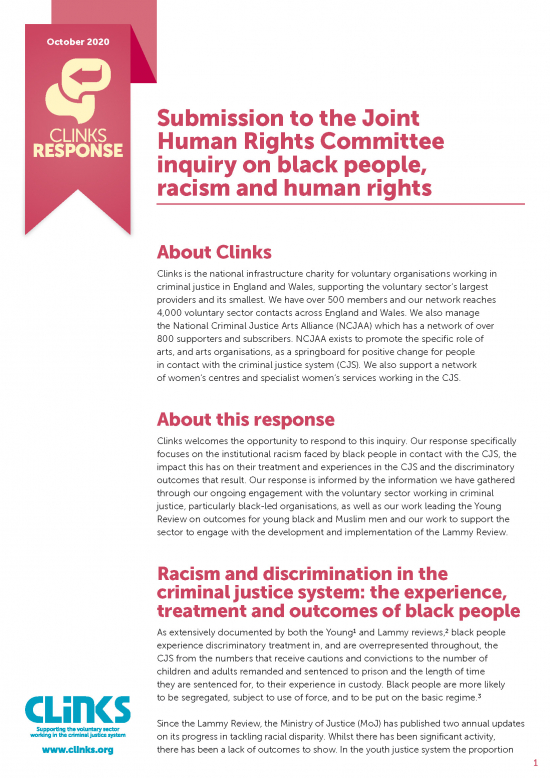
Clinks response: black people, racism and human rights
Response to the Joint Human Rights Committee inquiry on black people, racism and human rights
Clinks submitted evidence to the Joint Human Rights Select Committee inquiry on black people, racism and human rights. Our response focuses on the institutional racism faced by black people in contact with the criminal justice system (CJS), the impact this has on their treatment and experiences in the justice system and the discriminatory outcomes that result.
Our response highlights the inconsistent approach across government to tackling racial inequality and the overrepresentation of black people in the CJS. In particular we highlight policies towards gangs and youth violence that disproportionately impact young black people and undermine work to divert them from custody and contact with the CJS.
We also highlight the unequal treatment of black people in custody - where they are more likely to have force used against them, be segregated and be on the lower levels of the Incentives and Earned Privileges scheme - and raise concern about the lack of transparency and accountability over this. This is an issue which has been exacerbated in the Covid-19 crisis where there has been a lack of transparency over the number of positive cases of Covid-19 and related deaths by ethnicity.
In our response we recommend a consistent cross-government strategy to tackling racial inequality in the CJS and reducing the criminalisation of young black people. We ask that the strategy recognises how structural and institutional racism effects the implementation of policies and the impact they specifically have on black people, particularly increasing their risk of coming into contact with the CJS.
We also highlight the importance of engaging with and supporting the black-led voluntary sector that works in criminal justice and provides vital services but is often made up of small, grass-roots community organisations that face a number of structural barriers in delivering their services and face being squeezed out by larger organisations. During the Covid-19 crisis black-led voluntary organisations working in criminal justice and their service users have felt particularly ignored with concern that not enough is being done to safeguard the lives of both black prisoners and black staff. We therefore recommend that in the recovery from the pandemic, in recognition of the structural and overt racism in the CJS against black people and the disproportionate impact of Covid-19 on black communities and the organisations that work to support them, CJS funding should prioritise black-led services.